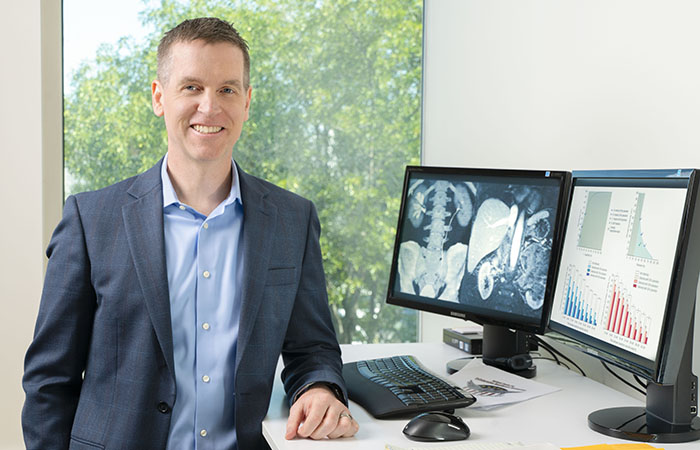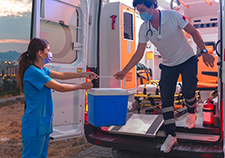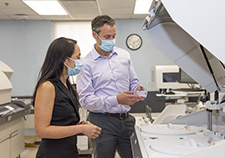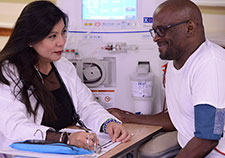Office of Research & Development |
 |


Dr. Thomas Osborne, chief medical informatics officer at the VA Palo Alto Health Care System, will lead a trial to evaluate an artificial-intelligence approach to early detection of acute kidney injury. (Photo by Adan Pulido)
August 20, 2019
By Mike Richman
VA Research Communications
"This project is yet another way VA is investing in first-class personalized medical care."
Researchers from VA and the artificial intelligence company DeepMind have achieved a promising medical breakthrough, developing a technology that has the potential to predict a life-threatening kidney condition up to two days before it happens.
The findings appeared in the journal Nature in July 2019.
“I commend the researchers from VA and DeepMind for performing this critical work,” VA Secretary Robert Wilkie says. “This technology advances the quality of care for our nation’s Veterans by predicting deterioration and alerting clinicians to the problem early. Clinicians must be able to identify risks to help prevent conditions like acute kidney injury.”

VA's new "burden-free" study method finds two blood pressure drugs equally effective

Hep C-positive organs, safe and effective for most transplant recipients

Researchers striving to improve detection of kidney disease in VA

Gene variants tied to kidney disease have only modest cardiovascular effect in African Americans
The researchers developed an artificial intelligence model that is based on retrospective VA data to predict the presence of acute kidney injury (AKI) in patients up to 48 hours before it would otherwise be identified. Their findings showed that the model predicted 56% of all in-patient episodes of AKI and 90% of the most severe cases where the patient later required renal dialysis. Dialysis is an artificial process that acts as a replacement for kidneys when they fail, using a special system to eliminate wastes, salt, and extra water from the blood without removing substances the body needs.
Acute kidney injury is often hard for clinicians to predict, and patients can deteriorate very quickly once it occurs. Foreseeing the condition up to two days in advance can help doctors initiate treatment to prevent deterioration of the kidneys.
“The important number is predicting 90% of the most severe AKI cases early, so slowing progression and preventing dialysis or transplant is feasible,” says Dr. Christopher Nielson, VA’s principal investigator on the study and the VA director of predictive analytics. “To evaluate this, you would need to do a randomized trial, which is being planned. Also, the risks of using artificial intelligence to identify patients at risk of needing dialysis are very low. The values of preventing dialysis and transplant are very high. If you save one person from renal failure or death, it’s worthwhile.”
“It would be wonderful if in medicine we had 100% accuracy in anything,” he adds. “But people think we have far more accuracy than we do. So 56% for predicting in-patient episodes of AKI isn’t bad at all. This is also a first model.”
The artificial intelligence model is based on an analysis of health patterns from a retrospective dataset of more than 700,000 deidentified patient records from VA medical centers. Ninety-four percent of the patients in the dataset were male. The model analyzes information from VA’s electronic health record to see what factors may signal an onset of acute kidney injury, including laboratory results, medications, vital signs, diagnoses, and procedures. The model will be further tested in an upcoming clinical trial.
The artificial intelligence model, the researchers write, has been “trained and evaluated on a clinically representative set of patients” from the VA system. But they add that the predominantly male demographic in the dataset “is not representative of the global population.”
“Validating the predictive performance of the proposed system on a general population would require training and evaluating the model on additional representative datasets,” the researchers write. “Future work will need to address the under-representation of sub-populations in the training data and overcome the effect of potential factors that relate to hospital processes,” such as how the outcome in cases of AKI may differ because decisions by the medical are team can vary based on the patient.
Acute kidney injury, once called acute renal failure, can progress to renal failure that requires dialysis. It can also cause death. But treatment is often effective if it’s initiated before the condition progresses. Certain diseases, some antibiotics, and crushing wounds are among the leading causes of AKI, which is common with older adults and patients who are in the hospital and intensive care units.
AKI causes a build-up of waste products in the blood and makes it hard for the kidneys to keep the right balance of fluid in the body and eliminate waste. It can also affect organs, such as the brain, heart, and lungs.
Currently, researchers at the VA Palo Alto Health Care System in California are planning a trial to evaluate the effectiveness of the AKI artificial intelligence model in a clinical setting.
The research team that took part in the Nature study is collaborating on designing a user interface that will be integrated into VA’s electronic health record (EHR)—the Computerized Patient Record System. The interface, in which a flag will pop-up to alert clinicians if a patient is at risk for acute kidney disease, will also be compatible with the new EHR that the Department of Defense is implementing. (VA is transitioning to the DOD system to allow for seamless care between the agencies.) Once the user interface is complete, at-risk patients at VA Palo Alto will be asked if they want to be part of the clinical trial.
Dr. Thomas Osborne, the chief medical informatics officer at VA Palo Alto, will be leading the trial.
“We are working on ways to optimally integrate this important technology into our electronic health record, so it will act as an early warning system and empower our clinicians to act even faster,” says Osborne, a physician with extensive experience in health technology. “As an advanced feature, we’re also designing the tool to graphically display medical data that the model has identified as risk factors for developing AKI. In the process, the interface will help highlight possible causes that our clinicians can more efficiently address. An additional exciting part of this project is that the same strategy we are developing can be used to positively impact the care of hundreds, perhaps thousands, of other medical conditions.
“This project is yet another way VA is investing in first-class personalized medical care,” he adds. “With support from our executive leadership, we’re on course to making a far-reaching impact on our Veterans, as well as the rest of society.”
Several years ago, VA entered into a medical research partnership with DeepMind to address the global issue of patient deterioration during hospital care, which may account for at least 10 percent of in-hospital deaths around the world. Nielson, who is also a professor emeritus at the University of Nevada, is VA’s principal investigator in the partnership.
The partnership is focused on analyzing patterns from more than 700,000 VA health records to develop algorithms that will identify risk factors for patient deterioration and predict its progression. Initial work has focused on identifying common critical diseases, such as acute kidney injury.
DeepMind, a London-based company that is part of Google, is a leader in artificial intelligence research. It has partnered with leading hospitals in Britain to apply its algorithms to research projects focusing on eye disease, head and neck cancer, and mammography.
VA Research Currents archives || Sign up for VA Research updates